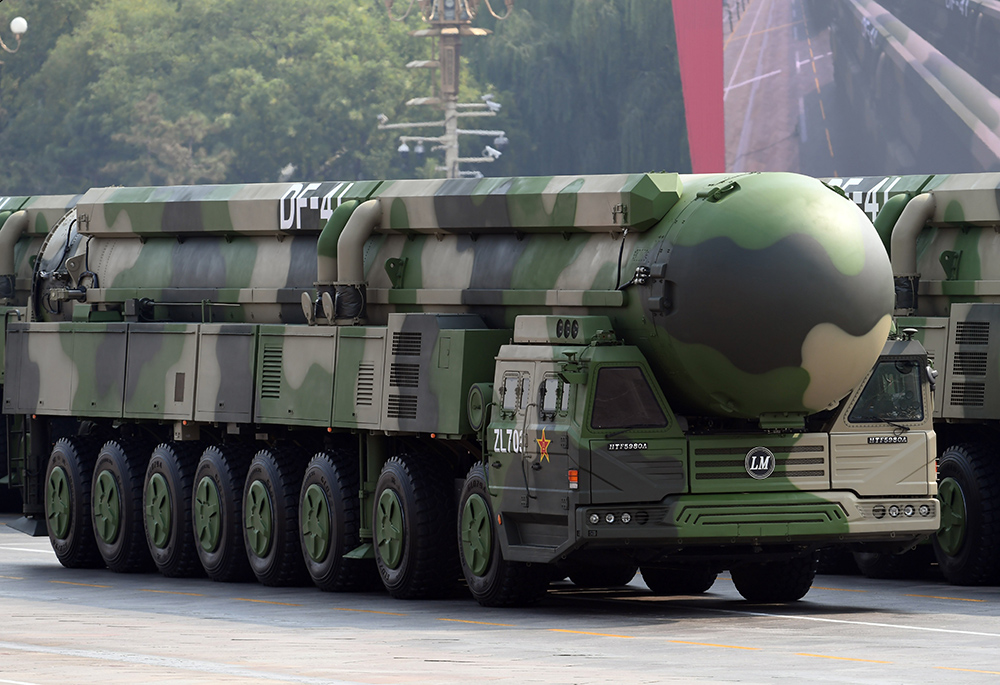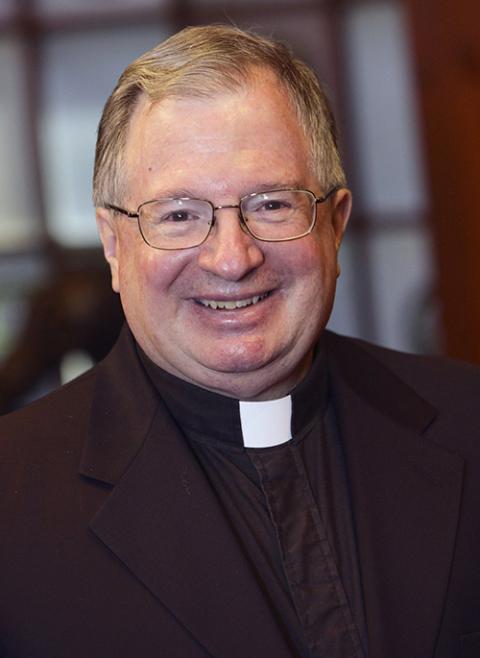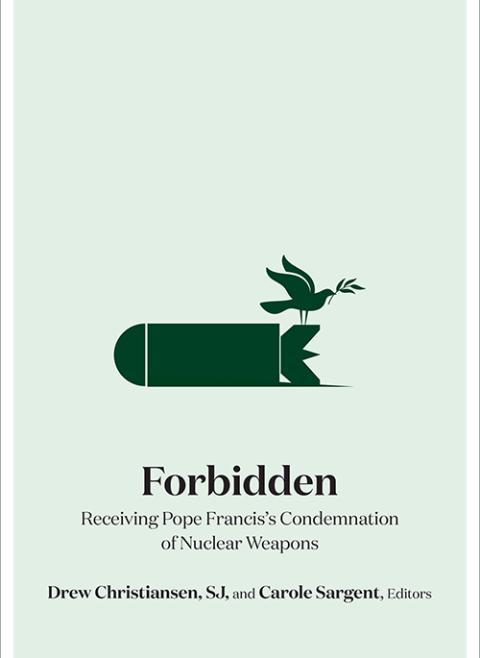
A Dongfeng-41 intercontinental strategic nuclear missiles group formation is seen Oct. 1, 2019, in Beijing. (CNS/Reuters/Weng Qiyu)
Jesuit Fr. Drew Christiansen's last book offers one of the boldest statements of his considerable published legacy, interrogating a serious clash between obedience and conscience. Forbidden: Receiving Pope Francis's Condemnation of Nuclear Weapons, has just been published by Georgetown University Press (March 2023).
In Drew's introduction and in two key chapters, he probes a fault line running through one of the most common misperceptions laypeople tend to have about the military, as they also do about Catholic sisters and priests: the obligations and limits of obedience. This fraught word, obedience, can strike the popular imagination as soulless passivity, usually in response to what they imagine must be order-happy superiors.
By contrast, when I think of Drew's teachings on obedience, I remember the scene from the 2010 French film "Of Gods and Men" ("Des Hommes e Des Dieux"), in which one of the monks says to their abbot, "We didn't elect you to decide on your own" ("nous ne t’avons pas élu pour décider seul"). Good monasteries run on wise and typically mutual discernment, not rigid edicts, and superiors are indeed elected. The abbott's silence showed he knew the monk was right. Obedience in religious contexts has never appropriately meant just putting your head down and saying "yes" without thinking.

Jesuit Fr. Drew Christiansen, professor of ethics and global development at Georgetown University, is seen in this 2009 file photo. He died April 6, 2022, at age 77. (CNS/Paul Haring)
"The duty of responsible obedience includes refusal," Drew writes in Forbidden. To me these are challenging words, and he cites the Nuremberg war crimes trials as hinging on this very duty. No one can ever order us to commit mass atrocities without our complicity. They also can't order us to take actions that go against our moral consciences. If they try, and if we comply, then we cannot later hide behind the excuse of just following orders.
Instead, in a stunning and intricate pair of chapters, Drew walks us through his pastoral accompaniment of soldiers and military officials as they navigate the most difficult moral dilemmas of our time, considering when it is prayerfully appropriate to say "no."
For those who didn't know him, Drew was well-known in Catholic circles as that classic behind-the-scenes Jesuit who whispers to power. When he worked for, and later advised, the U.S. bishops' conference in the 1980s and '90s, he contributed to historic documents, such as being a lead author on the 1991 pastoral, "Renewing the Earth," which engaged Catholic social teaching on the environment.
The document that is mentioned most often in connection with Drew is the 1993 "The Harvest of Justice is Sown in Peace." In his unpublished memoir that I was helping him edit, he noted that the vast majority of wartime casualties are civilian, citing 65% in the Vietnam era and up to 95% during the 1990s. The United Nations currently places this figure at 90%.
Civilian casualties troubled him deeply, and their prospect informed much of his engagement with nuclear weapons, because nukes by their very design target all life. He seemed mystified that U.S. military policy favored protecting only our civilians instead of all of them, believing (at least by implication, although I cannot ask him to clarify) that in wartime all noncombatants must be equally excluded from attack. Although the technological move from bombers to missiles to drones theoretically reduced civilian collateral damage by allowing more precise targeting, he was especially skeptical of drones, noting in that unpublished memoir that "drone warfare by the CIA is not conducted under the rules that apply to the military, allowing for unreported and unscrutinized noncombatant deaths."
Obedience in religious contexts has never appropriately meant just putting your head down and saying "yes" without thinking.
He and I met in early 2017 when I sought his advice. Through an odd set of circumstances Liturgical Press had signed me to write a book about my neighbor and friend Sr. Megan Rice, the Society of the Holy Child sister who with two Catholic Worker companions committed what some call the largest breach in U.S. nuclear security history. Katherine Marshall of Georgetown's Berkley Center sent me to Drew for counsel on how to navigate the tricky politics. He was well known at Georgetown as the former editor-in-chief of America: The Jesuit Review, but Marshall said he was also the best person to talk to about disarmament.
Drew was in the process of making plans for a November 2017 conference at the Vatican focusing on nuclear disarmament. I asked if I could join Georgetown's delegation, and he agreed. At that conference, we marveled as Francis became the first pontiff in the nuclear era to reject the Cold War policy of deterrence and call for total abolition, which our later article, published worldwide, explained.
Drew then accepted a mandate to publish two books in cooperation with the Holy See. The first was on the conference proceedings (A World Free from Nuclear Weapons: The Vatican Conference on Disarmament, Georgetown University Press, 2020). The second brought together theological and pastoral guidance on the practical ramifications of the pope's statement. Because he had challenges with his health I offered to help on the first one, and I would have happily done so uncredited. To my surprise, however, he made me his co-editor on both books, which I took on as a mission.
Advertisement
It is with his passionate interest in civilian protections in mind that I encourage you to read his contributions from this last book as a set: Chapter 20, "Pastoral Accompaniment: Pope Francis’s Approach to the Human Vocation," and Chapter 26, "In the Chain of Command."
Similar to his concern for civilian noncombatants, he shows a great heart for average women and men in the military and the national security sector, some of whom (I infer) may have been swept up in the "economic draft," seeing the military as a way out of poverty or limited middle-class options and toward a good education. Many enlisted to support themselves and their families, yet are not by nature warriors. For those who are either Catholic or who otherwise care what the pope has to say, he appreciated their dilemma, framing them in his Introduction as "[those] on whom the burden of [Pope Francis'] condemnation [of nuclear weapons] falls most heavily."
He then goes on, in the chapter "Pastoral Accompaniment," to tease through the practical ramifications:
In this context responsible moral agents should examine the courses of action open to them: Shall I promote negotiated disarmament more vigorously? Shall I resign or transfer to another branch of service? Shall I openly protest? Shall I resist from within? Shall I disobey? Shall I shift the direction of my research? Should I study alternative means of defense? The role of pastoral workers — bishops, pastors, teachers, and counselors — is to accompany people in discerning their paths of action as they take up this call.
Once Drew lays out the options, the sobering implication is clear. At some point when it comes to nuclear weapons and civilian casualties, people receiving orders may conclude that they cannot in good moral conscience comply.

The book cover to Forbidden: Receiving Pope Francis's Condemnation of Nuclear Weapons (Courtesy of Georgetown University Press)
In the chapter, "In the Chain of Command," Drew next recounts a history of senior military officers who have actually refused to launch nukes, laying out why their use is unthinkable. The decision-makers he focuses on were neither conscientious objectors nor rogue actors. Instead, context is everything.
For example, in 2017 Gens. Robert Kehler and John Hyten (both now retired) testified in different venues, one before Congress, that they would refuse to follow illegal presidential orders to launch a nuclear attack. However, note the word illegal. They didn't place themselves above the commander in chief. Rather, as Drew carefully points out, they cited norms of armed conflict from international law, the U.S. military code and their understandings of the just war tradition. Instead of blindly obeying, they said they would offer the president legal alternatives.
Drew also writes of two Russian soldiers. In 1962 during the Cuban missile crisis, Vasili Arkhipov refused to add his key to two others to launch a nuclear-armed torpedo against U.S. surface ships, even though his submarine was under attack. In 1983, Stanislav Petrov decided to ignore repeated computerized nuclear launch signals that turned out to be false alarms. He became known as "the man who saved the world," but his mental health suffered for the rest of his life.
I find these chapters remarkable because Drew knew he was advising some church leaders and their parishioners who will one day actually face these difficult moral challenges. He loved being a pastor, and during my time working with him I saw military people seek him out twice. One was in Rome when a family member of someone in the chain of command attended our talk at the Lay Centre at Foyer Unitas, and asked him to meet privately afterward. Another was back home in Washington, D.C., when a soldier sought him out. It all felt profound and immediate.
These moral questions are raging now, and we all must prepare, whether as ministers, as people in the decision-making pipeline, or as their loved ones and colleagues, to know how to address this monstrous question. Reading these two chapters carefully as his legacy pieces and gift to the church would be a fine start.






